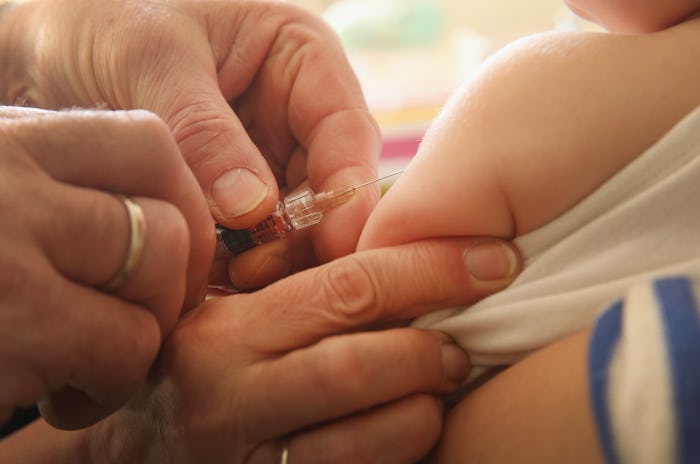Life

Evidence That Vaccines Cause Autism That Has Been Disproven
Despite overwhelming evidence to the contrary, there is still skepticism among some parents in the United States about the safety of vaccines. Any evidence that vaccines cause autism has been disproven and study after study shows no correlation between the two; and yet, the anti-vaccination movement is somehow still alive and well. Here's a quick look at a few times the hypothesis that vaccines cause autism has been debunked.
First, and most notably, an anti-vaccination group called SafeMinds once funded a six-year study to prove — once and for all — that vaccines cause autism. After the data was in, sorted, and analyzed, the study found no link between vaccines and autism. The study observed 79 monkeys in six different groups. Two of the groups were give the measles, mumps, and rubella (MMR) vaccine, which is most often said to cause autism by anti-vaccination groups. Two of the other groups were given vaccines that contain thimerosal, an antifungal that was suspect. The final two were control groups. The authors of the study wrote:
No behavioral changes were observed in the vaccinated animals, nor were there neuropathological changes in the cerebellum, hippocampus, or amygdala. This study does not support the hypothesis that thimerosal-containing vaccines and/or MMR vaccine play a role in the etiology of autism.
Of course, these results were less than satisfactory to SafeMinds. They put out a statement that said they had "concerns about changes in the study design protocol and analysis that may have led to these contradictory results."
The evidence does not stop there. The journal Jama studied 100,000 children who received the MMR vaccine, as well as the frequency of autism in their families. They found that even for the children who had siblings with autism, the vaccine did not increase their risk of having autism. The researchers wrote, "These findings indicate no harmful association between MMR vaccine receipt and ASD even among children already at higher risk for ASD."
Another study, published in the New England Journal of Medicine, had nearly identical conclusions. The study compared about 500,000 children with about 100,000 who didn't. There were no differences in the appearance of autism between the two groups. nearly half a million kids who got the vaccine were compared with some 100,000 who didn't, and there were no differences in the autism rates between the two groups. The authors wrote, "This study provides strong evidence against the hypothesis that MMR vaccination causes autism." The evidence goes on and on.
Finally, at the height of the anti-vaccination movement in 2014, a measles outbreak occurred due, according to Newsweek, to the high rate of unvaccinated Californians. In response, the state legislature passed a bill outlawing all non-medical vaccine exemptions. Since then, these common, controllable diseases have been kept at bay.
The irony of this situation is that parents looking to keep their children healthy in fact endangered them — and others — as a result. There is a lot we don't know about autism — that's true. But vaccinations have been effective and life-saving since their invention. There is no link between the two, and skipping out on vaccines because researchers are still studying autism isn't just ill-informed; it's dangerous.